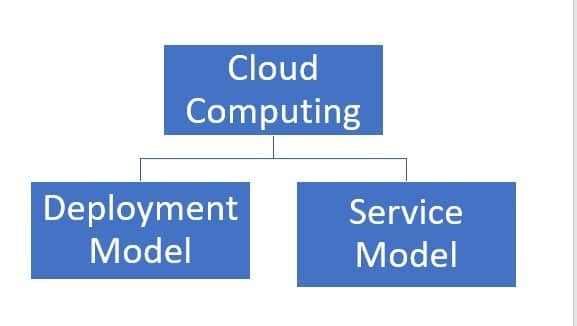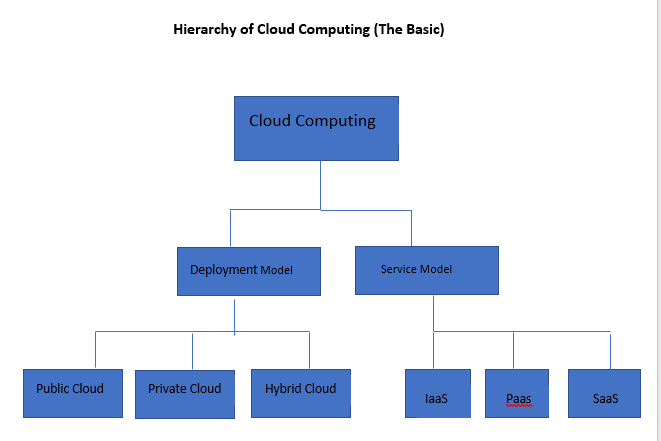Cloud Computing And It's Advantages
Cloud Computing and It’s Advantages
What is Cloud Computing? Firstly, what is the cloud? The cloud is a huge structure-like giant data center filled with servers which are still computes (utilizing computers) that provide services on behalf of clients.
Cloud Computing are data and applications being stored and run on the cloud instead of being stored or executed on your personal computer or any other hardware that you may own. These data and cloud-based applications, using the internet, can be accessed by user.
These servers in the cloud that are all networked together to be accessed on the internet play out various tasks, like running application, storing information, data processing, web facilitating, etc.
This being done, the workload is now in the cloud rather than on your PC, or other storage device that you own.
Cloud Computing are based on two main categories:
- Deployment Model
- Service Model
Let’s us take a quick look at the two types of cloud computing with some examples for proper understanding.
DEPLOYMENT MODEL: The deployment model is further classified into three types.
Public Cloud: This cloud infrastructure is used by the general public because it is accessible to everyone but managed by the Cloud Provider. Each person takes their data and stores it in this cloud and pay just for their own storage space.
Using a train as an example: I board a train to travel and I meet a lot of people because obviously I won’t be the only one on such a long vehicle. I pay for the seat I occupy and the time I spent in reaching my destination. If the journey is short, I pay less, if it is long, I pay more but it is a shared transportation (networking) nonetheless.
Private Cloud: This is buying my own space in the cloud that can be used only by me and owned by me. But in private cloud I have two options. For example, I can buy my own vehicle and use It as I wish for my movements, having already paid for the use of the car and it is now my own. The second option is renting a private taxi and having the service I pay for at that instance but just for my own services.
Therefore, the private cloud infrastructure is exclusively operated by a single organization (The organization or a third party)
Hybrid cloud: Is the integration of DC with the cloud using both of them to become a hybrid environment. That is offering the service of both the public cloud and the private cloud system.
NOTE: A domain controller (DC) is a server that responds to security authentication requests within a computer network domain. It is a network server that is responsible for allowing host access to domain resources.
Source: https://en.wikipedia.org
SERVICE MODEL: Service Model has three more categories and each service option has its own role it plays for your management. Infrastructure-as-a-service (IaaS), platform-as-a-service (PaaS), and software-as-a-Service (SaaS)
Infrastructure-as-a-service (IaaS): Users can access basic computing infrastructure through this cloud service model, which is commonly used by IT administrators. If your company needs resources like storage or virtual machines, this is the model for you because you only need to manage the data runtime, middleware applications and the operating system, the cloud providers will take care of the rest.
Platform-as-a-Service (PaaS): This service delivers cloud platforms and runtime environments for developing, testing and administering applications. If your business requires a platform for constructing software application. Users can deploy applications using this service model without having to purchase, administer, and maintain the corresponding architecture. The PaaS model is the best choice for you since it only requires that you manage the applications and data, runtime middleware, operating system, servers, storage and other components are taken care of by the cloud service providers.
Software-as-a-Service (SaaS): if you’d prefer not to worry about the hassles of owning any IT equipment, the SaaS model would be the one to choose. SaaS, or software as a service involves cloud services for hosting and managing your software applications. Software and hardware requirements are satisfied by the vendors so you don’t have to manage any of those aspects of the solution. With SaaS, the cloud service provider manages all aspect of the organization’s desired solution.
Popular Cloud Computing Services
Some of the popular Cloud computing services in the market are:
- Amazon Web Services (AWS)
- Microsoft Azure
- Sun Cloud
- Google Cloud Platform
- IBM’S Blue Cloud.
In conclusion, cloud computing has revolutionized the way organizations and people alike store, access, and use data and applications. It is a well-liked option for enterprises of all sizes due to its scalability, cost-efficiency, and flexibility. Cloud Computing may raise some privacy concerns, but with careful planning and execution, these risks can be reduced.
Cloud Computing is likely to play a significant role in determining the future of computing as technology develops.
© 2023 Deborah Osadjere























